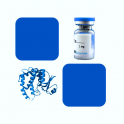
- Remove this product from my favorite's list.
- Add this product to my list of favorites.
Products
Viewed products
Newsletter
 |  |  |  |  |  |

Background
Programmed cell death protein 1 (PD-1) is also known as CD279 and PDCD1, is a type I membrane protein and is a member of the extended CD28/CTLA-4 family of T cell regulators. PDCD1 is expressed on the surface of activated T cells, B cells, macrophages, myeloid cells and a subset of thymocytes. PD-1 has two ligands, PD-L1 and PD-L2, which are members of the B7 family. PD-L1 is expressed on almost all murine tumor cell lines, including PA1 myeloma, P815 mastocytoma, and B16 melanoma upon treatment with IFN-γ. PD-L2 expression is more restricted and is expressed mainly by DCs and a few tumor lines. PD1 inhibits the T-cell proliferation and production of related cytokines including IL-1, IL-4, IL-10 and IFN-γ by suppressing the activation and transduction of PI3K/AKT pathway. In addition, coligation of PD1 inhibits BCR-mediating signal by dephosphorylating key signal transducer. In vitro, treatment of anti-CD3 stimulated T cells with PD-L1-Ig results in reduced T cell proliferation and IFN-γ secretion. Monoclonal antibodies targeting PD-1 that boost the immune system are being developed for the treatment of cancer.
Source
Recombinant Biotinylated Cynomolgus PD-1, His,Avitag (PD1-C82E6) is expressed from human 293 cells (HEK293). It contains AA Leu 25 - Gln 167 (Accession # B0LAJ3).
Predicted N-terminus: Leu 25
Molecular Characterization
This protein carries a polyhistidine tag at the C-terminus, followed by an Avi tag (Avitag™).
The protein has a calculated MW of 19.5 kDa. The protein migrates as 30-45 kDa under reducing (R) condition (SDS-PAGE) due to glycosylation.
Biotinylation
Biotinylation of this product is performed using Avitag™ technology. Briefly, the single lysine residue in the Avitag is enzymatically labeled with biotin.
Biotin:Protein Ratio
Passed as determined by the HABA assay / binding ELISA.
Endotoxin
Less than 1.0 EU per μg by the LAL method.
Purity
>90% as determined by SDS-PAGE.
Formulation
Lyophilized from 0.22 μm filtered solution in PBS, pH7.4 with trehalose as protectant.
Reconstitution
See Certificate of Analysis for details of reconstitution instruction and specific concentration.
Bioactivity
Please refer to product data sheet.
Storage
For long term storage, the product should be stored at lyophilized state at -20°C or lower.
Please avoid repeated freeze-thaw cycles.
This product is stable after storage at:
-20°C to -70°C for 12 months in lyophilized state;
-70°C for 3 months under sterile conditions after reconstitution.
(1) "Tislelizumab Plus Platinum and Etoposide Versus Placebo Plus Platinum and Etoposide as First-Line Treatment for Extensive-Stage Small Cell Lung Cancer (RATIONALE-312): a Multicenter, Double-Blind, Placebo-Controlled, Randomized, Phase 3 Clinical Trial"
Cheng, Fan, Zhao et al
J Thorac Oncol (2024)
(2) "Increased PD-1 expression on circulating T-cells correlates with inferior outcome after autologous stem cell transplantation"
Richter, Böttcher, Stoll et al
Transplant Cell Ther (2024)
(3) "MGP+ and IDO1+ tumor-associated macrophages facilitate immunoresistance in breast cancer revealed by single-cell RNA sequencing"
Chang, Jiao, Zhang et al
Int Immunopharmacol (2024) 131, 111818
Showing 1-3 of 31221 papers.
Recombinant Human PD-L1/B7-H1 Protein, low endotoxin, Fc Tag, 100µg - 429,00 €
Recombinant Human PD-1 / PDCD1 Protein, Fc Tag (HPLC-verified), low endotoxin,100µg - 461,50 €
Recombinant Mouse PD1 /PDCD1 Protein, Fc Tag, 100µg - 468,00 €
Recombinant Human PD-1 / PDCD1 Protein (HPLC-verified), His Tag, 100µg - 461,50 €
Recombinant Cynomolgus PDCD1 /PD1 Protein, Fc Tag (MALS verified), 100µg - 442,00 €
Follow us